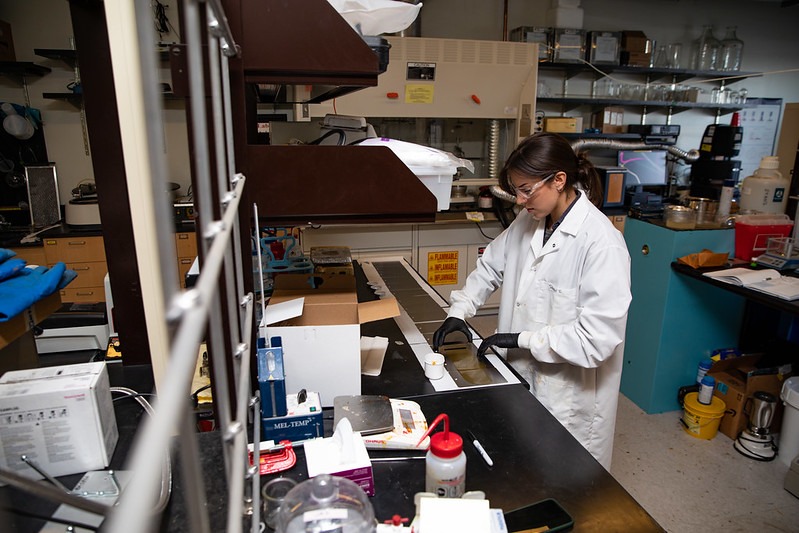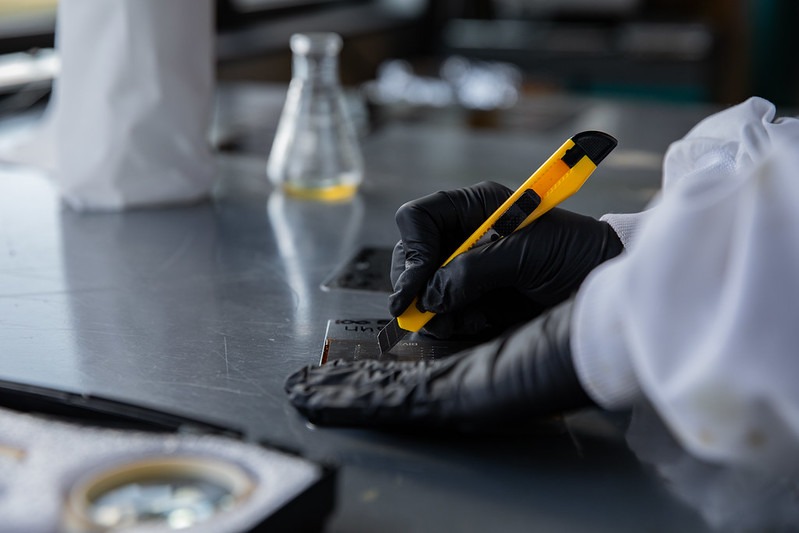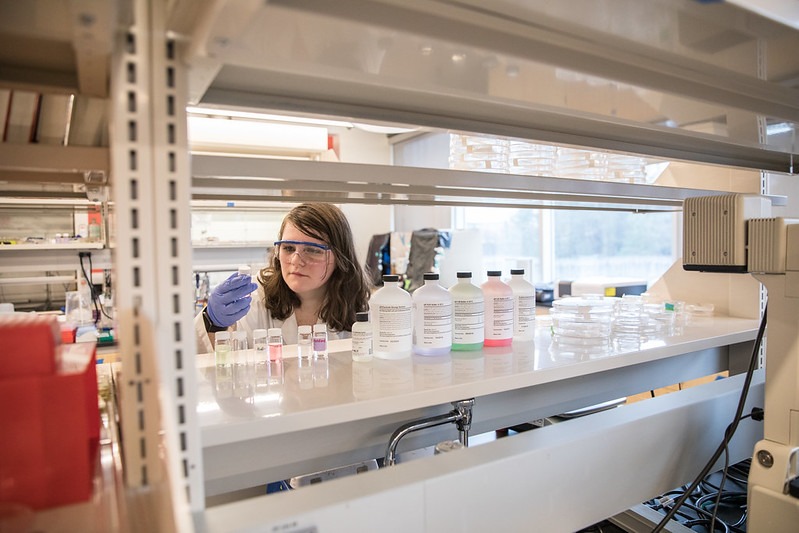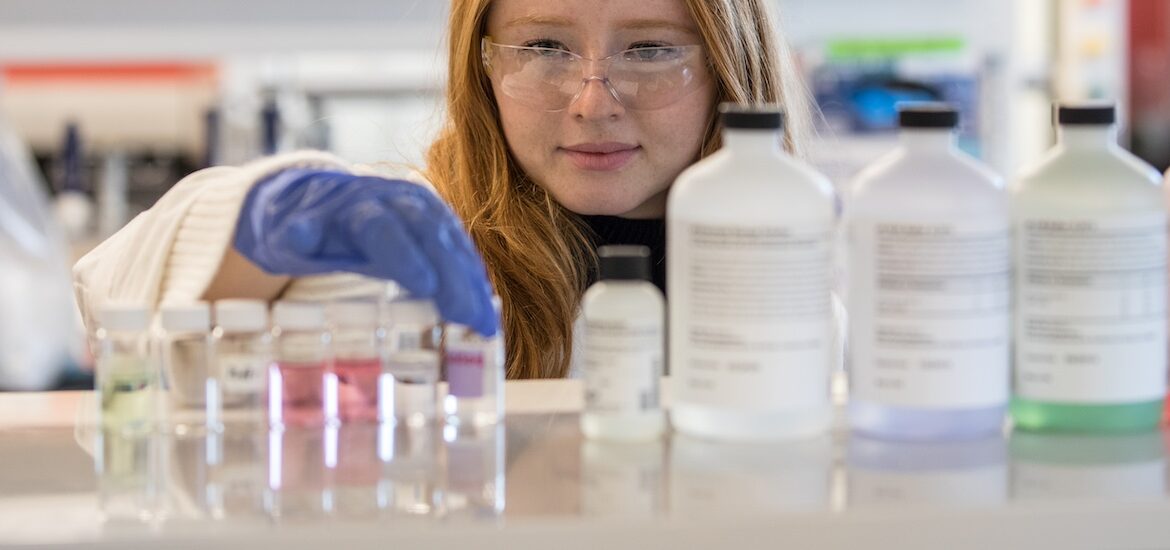A Practical & Informative Guide to Explain What Chemical Engineers Do
Ever wonder how everyday materials—like the shampoo in your shower or the fuel in your car—get made? Chemical engineering is the science behind it all.
From developing clean energy to improving food production, chemical engineers work on processes that make life more efficient, safe and sustainable. If you’re curious about how things are made and want to make a difference in industries like healthcare, energy, defense (government and military) or manufacturing, chemical engineering might be for you.
Our students’ voices and experiences speak for themselves – hear what they have to say about being a chemical engineering major at Rowan University.
What is Chemical Engineering?
Chemical engineering is an engineering discipline that transforms raw materials into useful products. Examples of chemically-engineered products include antibiotics and vaccines, pharmaceuticals, clean water, fuels, fertilizers, adhesives, fabrics, catalytic converters, electronic chips and batteries.
Chemical engineers design and develop chemical processes to make these products on a manufacturing scale that are efficient, cost-effective, safe, and environmentally responsible. To achieve these goals, chemical engineers apply their knowledge and skills in math, economics and sciences (in particular, chemistry.)

What Do Chemical Engineers Do?
Graduates with a chemical engineering degree have a wide range of career opportunities. Many go on to work in industries like energy, pharmaceuticals, environmental engineering, food production and materials science. Others pursue advanced degrees in engineering, business or medicine.
Here are just a few career paths you could take with a chemical engineering degree:
- Process Engineer – Design, implement and optimize industrial processes in sectors like oil refining, chemical manufacturing or food production.
- Pharmaceutical Engineer – Develop and scale production of medications, ensuring quality and compliance with regulations.
- Environmental Engineer – Address sustainability challenges through pollution control, waste management and clean energy innovation.
- Materials Scientist – Create and test new materials used in products ranging from electronics to sustainable packaging.
- Safety Engineer – Monitor and improve workplace safety in chemical plants and production facilities.
- Technical Consultant – Advise companies on process improvements, environmental compliance or product development.
What Do Chemical Engineering Majors Learn?
Coursework in this major blends the core principles of chemistry, physics, biology and mathematics with advanced engineering concepts. Through hands-on labs and real-world projects, students gain the practical skills and scientific foundation needed to design and improve industrial systems, processes and products.
Upper-level elective and required courses in the Chemical Engineering major include classes such as:
- Chemical Reaction Engineering
- Heat and Mass Transfer
- Process Fluid Transport
- Chemical Process Dynamics and Control
- Chemical Plant Design
- Separation Processes
- Materials Science & Engineering
- Biochemical Engineering
- Polymer Engineering
- Engineering Clinic (I-VIII, project-based coursework)
- Process Safety
- Air Pollution Control and Environmental Engineering
- Process Design Principles

Engineering Clinic at Rowan University
At Rowan University, a core part of the curriculum is Engineering Clinic. Beginning that first semester of freshman year and ending at graduation, every semester all engineering majors take Engineering Clinic.
Clinic offers continual active learning through engineering and research projects with faculty. The projects, often industry-driven, enable students to tackle open-ended challenges and real-world issues. In Clinic, an interdisciplinary team of student engineers collaborate to work together toward a solution.
This series of 3-minute videos highlights recent student projects in Engineering Clinic.
Engineering disciplines represented in Clinic:
- Biomedical Engineering
- Chemical Engineering
- Civil Engineering
- Computer Engineering
- Construction Management
- Electrical Engineering
- Engineering Entrepreneurship
- Environmental Engineering
- Mechanical Engineering
A student-favorite, Clinic helps to ensure graduates are equipped to address complex challenges. This course also helps students to grow the soft skills necessary in industry, including communication and teamwork.

Chemical Engineering Education at Rowan University
Here’s what makes our program stand out:
- ABET accreditation ensures a rigorous and respected curriculum.
- Small class sizes.
- High return on investment with quality education at highly affordable tuition.
- Students can explore a range of interests, from energy systems to biotechnology.
- Hands-on research and internship opportunities connect students with real industry projects.
- Advanced study options, including a Master of Science in Chemical Engineering for those looking to deepen their expertise.
With dedicated faculty, innovative labs, and strong industry connections, our program helps future chemical engineers build the skills they need—and put them to work.
To pursue chemical engineering at Rowan University, we encourage you to learn more about our program and apply.

